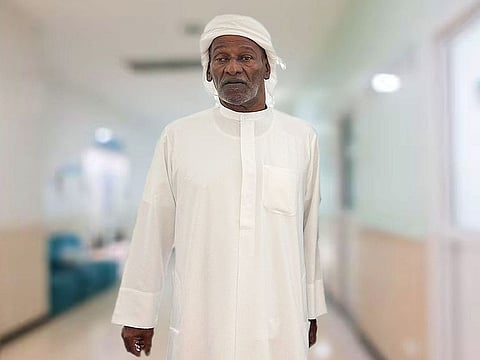Emirati thankful for ‘miracle’ that restores his vision
UAE doctors save left eye of 60 year old whose vision is already impaired in right eye

Sharjah: Hajji Abbas Gyholoom Tawakol Qamar, a 60-year-old Emirati resident of Sharjah, can hardly see in the right eye.
Now his left eye too was damaged after a foreign particle got in, impairing his vision further.
A father of six, he faced a daunting battle against what doctors diagnosed as “corneal opacity” in the left eye which was threatening to shroud his world in darkness.
“I travelled to another country twice to consult doctors there for the corneal injury, and they were of the view that it was necessary to perform a corneal transplant. But there was a fear that it would not be successful. So I too was reluctant to exercise the option,” he told Gulf News.
It was upon his return to the UAE that he hit his left eye and a foreign particle got in. It threatened his ability to perform even his daily tasks.
His visual impairment began to weigh on him, and even affect his livelihood.
It was around this time that he approached the Ophthalmology Department at NMC Royal Hospital Sharjah. He had come to the hospital to get his regular tests done.
Dr. Ahmed Mostafa, an eye specialist, who he was referred to, did a detailed investigation and concluded that all was not lost.
Pioneering surgery
He was going to conduct a pioneering surgery to restore clarity to Hajji’s world.
Speaking to Gulf News, he said, “There was huge risk of him losing his vision in the left eye permanently if he went in for a cornea transplant. So I recommended that he go in for a Photo Therapeutic Keratectomy (PTK) surgery. It involves the precise removal of affected corneal tissue using an excimer laser.”
Moreover, it was a fairly quick and simple procedure.
When the patientagreed, Dr Mostafa reshaped his cornea in just 10 minutes with the new procedure. The opacity that once clouded his vision was cleared.
Dr. Mostafa said, “PTK allows us to remove damaged tissue, preserving the healthy cornea selectively. This surgical marvel significantly improves visual acuity, transforming patients’ lives.”
An ever-grateful Qamer says he is thankful for the miraculous transformation. “Before the procedure, I couldn’t really see properly, but now I can,” he said, adding he feels more alive.
What is corneal opacity?
Corneal opacity is the loss of transparency of the cornea, which is the first layer of the eye. When the cornea gets damaged or scarred, it can become opaque. This prevents light from passing through, negatively affecting vision. Signs and symptoms of corneal opacity include blurred sight, glaring and loss of vision or blindness,



